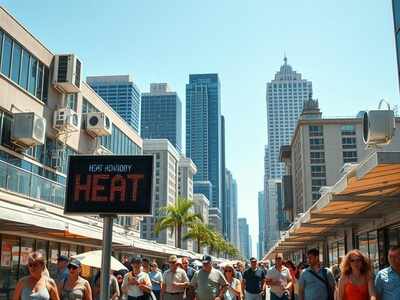ARTICLE AD BOX

America’s economic map reveals stark contrasts. While metros such as Raleigh and Nashville thrive on technology, healthcare, and finance-driven growth, several other cities remain mired in weak job creation, stagnant wages, and limited opportunities.
A recent ranking from Checkr, using federal data, highlights the widening gulf between booming and struggling urban economies.Checkr’s analysis, drawing on figures from the Bureau of Labor Statistics, U.S. Census Bureau, and Bureau of Economic Analysis, examined the 100 largest cities across two dimensions:
- Employment opportunity: Gauging unemployment rates, labor force growth, job openings, and workforce size.
- Earning potential: Evaluating real per capita income, decade-long income growth, and the share of households earning above $200,000.
Six cities at the bottom
Six urban centers illustrate the struggles most vividly, ranking among the lowest for both jobs and income:
- Bakersfield, California: Burdened by an overreliance on agriculture and energy, Bakersfield faces one of the highest unemployment rates in the nation at 9.6%. Its economic dependence on volatile industries leaves workers vulnerable to downturns.
- Scranton, Pennsylvania: Once a manufacturing hub, Scranton has not fully recovered from industrial decline. Job creation lags behind national trends, and the city struggles to attract new business sectors.
- McAllen, Texas: Despite its proximity to the border, McAllen’s economy remains dominated by low-wage service industries. With unemployment at 6.4%, the city finds it difficult to generate sustainable, high-paying jobs.
- Fresno, California: Like Bakersfield, Fresno leans heavily on agriculture. Its unemployment rate of 8.5% places it among the highest in the country, reflecting limited diversification into technology or high-growth industries.
- Memphis, Tennessee: While historically significant as a logistics hub, Memphis faces stagnation in wage growth and persistent poverty levels. Its dependence on traditional sectors curbs broader economic expansion.
- Jackson, Mississippi: With an unemployment rate of 6.2% and entrenched poverty challenges, Jackson has struggled to modernize its economy or attract outside investment.
The broader challenge
These cities underscore a common problem: Industries that once powered regional economies are no longer sufficient to sustain them.
Without diversification into fields like technology, advanced manufacturing, or healthcare, local job markets remain constrained.Sam Radbil, Checkr’s research strategist, observed that such economies not only lack momentum but also fail to provide competitive wages.
The divide deepens
For residents in cities like Bakersfield or Scranton, lower costs of living may seem appealing, but affordability cannot offset weak job markets and limited upward mobility. In contrast, high-growth metros continue to attract investment, talent, and innovation, widening the gap between America’s economic winners and losers.The Checkr study makes one point clear: without fresh investment and new industries, these cities risk being left behind in a national economy that is otherwise expanding.



.png)
.png)
.png)
















 1 day ago
4
1 day ago
4









 English (US) ·
English (US) ·